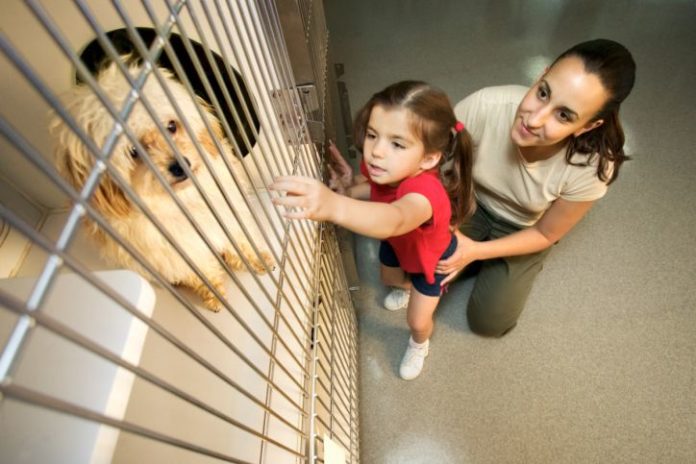Let’s just begin with a little bit of the nitty gritty: In 2011, over 67,000 dogs and 64,000 cats were handed over to the RSPCA in Australia. These are the same cute and cuddly animals that new owners soon realise they’re not prepared to care for. If you already find yourself thinking, “that could be me,” it’s probably not time for you to get a pet.
Even though having a family pet can be a wonderful thing, you mustn’t underestimate the amount of work and time that you’ll have to put into caring for your new little critter. Before you take the plunge into becoming an owner of a sweet little puppy or playful kitty, remember that this ball of fur will most likely be around long after your kids fly the coop. Don’t make a rash decision. Take time to carefully consider whether you and your family are ready for the dedication, time and financial commitment that a pet requires. If you’re not scared off just yet, read on.
63% of Australian households currently own a pet. It’s true, a pet brings excitement, joy and companionship along with physical and mental health benefits to everyone in the family. Pet ownership is not only fun but it has also been found to improve minor health ailments, reduce anxiety, loneliness, depression, stress and risk factors for obesity and heart (cardiovascular) disease. If you have children, the addition of a dog to the family decreases the risk of obesity and allergies linked to asthma. It also enhances social and emotional development. If kids are held to their commitments as responsible pet owners, they’ll also learn a sense of respect for animals and responsibility in life. It can be a great thing for the whole family.
Important things to consider
 It is really important that getting a new pet be a well thought out and informed decision. It’s not nice for the animal or the family when a family realizes that they don’t have what it takes to care for a pet.
It is really important that getting a new pet be a well thought out and informed decision. It’s not nice for the animal or the family when a family realizes that they don’t have what it takes to care for a pet.
When trying to decide if you’d be a good pet owner, make sure you consider whether you:
- can afford a pet;
- have enough time for a pet;
- have a lifestyle which can accommodate a pet;
- believe a pet would be appropriate for your kids;
- are prepared to care for a pet for its whole life; and
- have living arrangements suitable for a pet.
Some questions to ask yourself
- Do I have enough money to support a pet?
Like kids, pets cost money and sometimes a lot of it. From the start, you’ll need to buy all sorts of stuff, from bedding, food, collars, to leads and toys; you’ll want to ensure your pet has everything they need to settle into their new home. Then you will need to consider the cost of vaccination, worming, microchipping, desexing, puppy pre-school/training, grooming, boarding, insurance and vet bills. Many owners don’t even consider the costs associated with replacing the pair of shoes that the new puppy decided to chew through or the expensive hand bag that the kitty took for a litter tray. And a good rule to remember is that generally, the larger the animal, the greater the cost.
- It’s just an animal. How much time do I really need to give a pet?
Pets require a lot of time and patience just like any other member of your family does. They need to be trained, groomed exercised, socialised, cleaned up after and genuinely loved. It’s true that we all have good intentions of ensuring kids take responsibility for their pets, but statistics show that the majority of the responsibility falls on the adult female in the family. If you work full-time or have a household of children and tasks of your own to do, chances are cleaning up after a dog or cat is not so appealing. At the end of the day, when you’re flat out exhausted, are you going to want to take a dog for a walk or clean the littler tray
People live in many types of abodes, from apartments and houses built on cottage blocks with no backyards to larger more spacious properties. You need to consider the space you have before you decide on a pet. Rental properties often do no permit pet ownership, making it difficult for you to move to a new residence and have your pet stay with you. This is a massive inconvenience and if living in a city, it can really limit your choices when trying to relocate. Whilst 63% of all Australian households own pets, less than 17% of rental households are among these. If you live in a share-house be sure that your housemates are consulted on your decision to buy a pet as approximately 15% of people are allergic to animals and others might have fears of a certain species.
 It is so simple to buy a pet. In fact, it can be quite effortless and this makes it is very easy to forget that the new addition to your family will be around for an average of 12 years. Cats can even get into their twenties. And what comes as a surprise to many is that puppies become dogs and kittens become cats. They don’t stay small and sweet for very long. You need to be prepared to care for your animal as it grows into an adult and eventually reaches old-age. Just like people, animals can become incontinent, suffer from chronic arthritis, lose teeth and even get bad breath. When the time comes, be aware that it is often devastating for a child to say goodbye to their beloved family pet. It may seem really early to think about your pet’s death before you’ve even gotten a pet but you need to be prepared to deal with the difficulty of death and maybe euthanasia when the time comes.
It is so simple to buy a pet. In fact, it can be quite effortless and this makes it is very easy to forget that the new addition to your family will be around for an average of 12 years. Cats can even get into their twenties. And what comes as a surprise to many is that puppies become dogs and kittens become cats. They don’t stay small and sweet for very long. You need to be prepared to care for your animal as it grows into an adult and eventually reaches old-age. Just like people, animals can become incontinent, suffer from chronic arthritis, lose teeth and even get bad breath. When the time comes, be aware that it is often devastating for a child to say goodbye to their beloved family pet. It may seem really early to think about your pet’s death before you’ve even gotten a pet but you need to be prepared to deal with the difficulty of death and maybe euthanasia when the time comes.
Regardless of a pet’s age or species, rest assured that it will need a lot of love and attention. Long working hours, a busy social life and regular holidays are all factors that need to be considered before purchasing a pet. And if you’re pet gets left alone and lonely, you’ll see that boredom is a recipe for misbehaving. Dogs left alone will often bark like crazy, dig up the backyard and in general, embark on a long line of destructive behaviour. Neighbours will not be a fan of you or your pet if they’re disturbing the peace consistently and you’ll feel stressed and anxious whenever you leave the house. You also need to consider whether having a pet is going to impact on your family holidays. If you choose to head away and leave the pet behind, you will need to make sure they are looked after. If you do not have family or friends that can help out, you might need to send your animal to a boarder. For an average dog, this will cost at least $140/week.
- Will my children be okay with a pet in the house?
It is so important to consider the safety of your children when getting a pet as kids often have no understanding of the potential danger an animal may pose. No dog should be trusted with babies and small children alone, no matter how well you feel you know the animal. Most people are aware that a number of dog breeds are declared dangerous and are not suitable as family pets, but the risk associated with smaller pets is often overlooked. Toy and small breeds, such as the Chihuahua, can often be nervous and snappy little guys. Some animals react poorly when they’re afraid, or if they experience pain or feel like there’s competition when it comes time to feed. You must always teach your children to remain calm and quiet around pets and never tease, hurt or corner them. Only you know your children well enough to decide whether their temperament will suit having an animal.
It is true that children reap many benefits from owning a pet, but there are times when kids and animals just don’t work together, especially if there are health concerns. Some children have serious allergies and cannot be around certain species or breeds of animals. Pet allergies occur when the immune system reacts to a specific foreign substance found in skin flakes, saliva and urine of animals or the pollen, mold and dust that collects in an animal’s coat. Cat allergies are approximately twice as common as dog allergies. You need to be particularly aware of this if your child suffers from other allergies or is asthmatic, as both groups tend to have a higher incidence of animal allergies.
Purchasing a pet should never be an impulsive decision. It’s not like deciding last minute to get take-away and thus should be treated seriously and with care. While owning a pet can be fun and rewarding, it is crucial to remember that pet ownership is also a huge responsibility.
It can be very hard to resist the puppy or kitten at the local pet shop with their soft fur and floppy ears, but remember that pets may be easy to purchase but looking after them is not an easy task. If you have read this far and have yet to run away with your tail between your legs, then there’s a good chance that a critter will make a wonderful addition to your family. Be sure to buy your animal from a good breeder and choose a breed that best suits your family and lifestyle.
Kindly written and reviewed by Dr Abbey Potter BSc (Hons) BVMS PhD, Lecturer in Physiology, Murdoch University, Western Australia and Registered Veterinarian.
References
- AAFA – Asthma and Allergy Foundation of America (2005). Pet Allergies. Available from: URL Link
- ABC Adelaide: No pets please plea for Christmas presents – RSCPA Interview (2010). Available from: URL Link
- ACAAI – The American College of Allergy, Asthma and Immunology. Pet Allergies Information. Available from: URL Link
- ACAC – The Australian Companion Animal Council Inc. (2009) The Power of Pets: The Benefits of Companion Animal Ownership. Available from: URL Link
- Anderson, W. P. and G. L. Jennings (1992). “Pet ownership and risk factors for cardiovascular disease.” The Medical Journal of Australia 157(5): 298-301. (Abstract)
- Boston Children’s Hospital (2012) Animal allergy. Available from: URL Link
- Crowley-Robinson, P., D. C. Fenwick, et al. (1996). “A long-term study of elderly people in nursing homes with visiting and resident dogs.” 47(1): 137-148. (Abstract)
- Cutt, H. E., M. W. Knuiman, et al. (2008). “Does getting a dog increase recreational walking?” International Journal of Behavioral Nutrition and Physical Activity 5(17). (Full text)
- Filiatre, J. C., J. L. Millot, et al. (1986). “New data on communication behaviour between the young child and his pet dog.” Behavioural Processes 12(1): 33-44. (Full text)
- Gern, J. E., C. L. Reardon, et al. (2004). “Effects of dog ownership and genotype on immune development and atopy in infancy.” Journal of Allergy & Clinical Immunology 113(2): 307-314. (Full text)
- Jennings, L. B. (1997). “Potential benefits of pet ownership in health promotion.” Journal of Holistic Nursing 15(4): 358-372. (Abstract)
- Petcare Information and Advisory Service (2012). Pet Statistics. Available from: URL Link
- RSPCA Australia (2011). Annual Statistics. Available from: URL Link
- Serpell, J. (1991). “Beneficial effects of pet ownership on some aspects of human health and behaviour.” Journal of the Royal Society of Medicine 84(12): 717-720. (Full text)
- Siegel, J. M. (1990). “Stressful life events and use of physician services among the elderly: the moderating role of pet ownership.” Journal of Personality and Social Psychology 58(6): 1081-1086. (Abstract)
- Timperio, A., J. Salmon, et al. (2008). “Is dog ownership or dog walking associated with weight status in children and their parents?” Health Promotion Journal of Australia 19(1). (Abstract)



 (9 votes, average: 4.56 out of 5)
(9 votes, average: 4.56 out of 5) 






